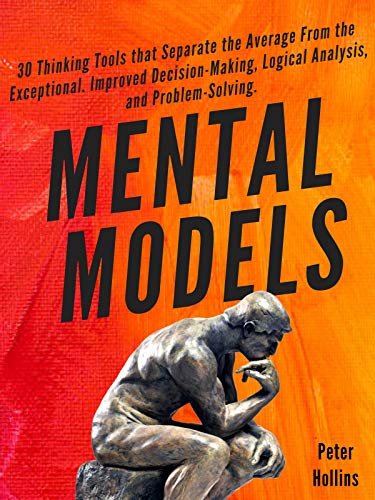This post is part of the 📖 Mental Models series.
Today, I am reading the sixth mental model Minimize Regret from Decision-Making for Speed and Context chapter of the book Mental Models written by Author Peter Hollins.
Mental Models are like giving a treasure map to someone lost in the woods. They provide instant understanding, context, and most importantly, a path to the end destination. Now imagine having such a map for all problems and decisions in your life.
In this book Mental Models, author Peter Hollins discuss 30 mental models that billionaires/CEOs, Olympic athletes, and scientists use to think differently and avoid mistakes.
Battle information overwhelm, focus on what really matters, and make complex decisions with speed and confidence.
Yesterday, I finished reading the fifth mental model Stay Within 40-70%.
Chapter #1: Decision-Making for Speed and Context
Mental Model #6:
Minimize Regret
Use to consult the future you on decisions.
This is the mental model of avoiding regrets and making regret the centrepiece of our decision-making calculus.
Jeff Bezos once found himself at a crossroads in his life in which he had to make some tough personal resolutions. He came up with a concept he termed the “regret minimization framework”.
The concept of the regret minimization framework is quite basic.
Bezos gave himself three specific mental directives:
- Project yourself to age 80.
- Imagine yourself looking back on your life at that age, knowing that you want to feel as few regrets as possible.
- Ask yourself, “In X number of years, will I regret taking this action (or not taking this action)?”
Summary
- Minimize Regret. Jeff Bezos developed what he calls the regret minimization framework. In it, he asks one to visualize themselves at age 80 and ask if they would regret making (or not making) a decision. This simplifies decisions by making them about one metric: regret.
That’s it for today. Tomorrow, we will read the seventh mental model Ignore “Black Swans”, use to understand how outliers shouldn’t actually change your thinking.
Address “Important”; Ignore “Urgent”
Identify and address important tasks, ignore urgent tasks. Delegate important but non-urgent task and delete not important and not urgent tasks.
Visualize All the Dominoes
Don’t stop your analysis once the most obvious situations are articulated. Consider as many long-term possible ramifications as you can. Think twice about what you’re doing, and it helps to eliminate rash decisions.
Make Reversible Decisions
If you want to make the best decision possible, you can go ahead and use reversible decisions to learn exactly what you need to know.
Seek “Satisfaction
We need far fewer things than we originally thought and that our desires are masquerading as needs. Use Seek “Satisfaction” to achieve your priorities and ignore what doesn’t matter by creating a default choice.
Stay Within 40-70%
Utilize this mental model by intentionally consuming less information and even overgeneralizing — this means not looking at the subtleties of your options.
Minimize Regret
Minimize Regret. Jeff Bezos developed what he calls the regret minimization framework. In it, he asks one to visualize themselves at age 80 and ask if they would regret making (or not making) a decision. This simplifies decisions by making them about one metric: regret.
Author(s): Peter Hollins
Part 7 of 29 in the 📖 Mental Models book series.
Series Start | Mental Models - Day 6 | Mental Models - Day 8
